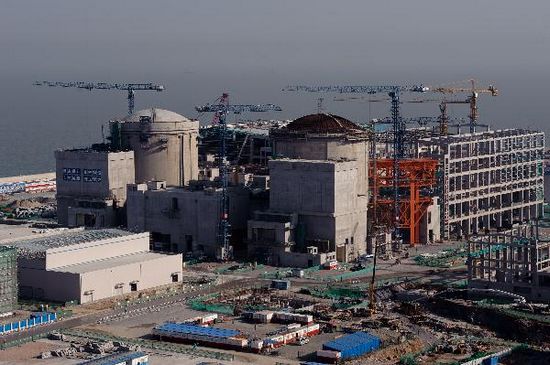China mulls nuclear restart

The central government on Tuesday drafted a $12 billion plan to boost safety in the nuclear industry, which analysts say will pave the way for more nuclear power plants to be built in China.
The nuclear safety plan, published on the website of the Ministry of Environmental Protection, gave approval to a group of key projects, including nuclear waste treatment plants and remodeling projects to improve the safety level of existing nuclear facilities.
The plan also indicated that the mixed models of nuclear reactors imported from different countries complicated the safety protocols and emergency procedures and urged different nuclear facilities to pay more attention to safety regulations.
The total cost of the proposed projects is 79.8 billion yuan ($12.76 billion).
The Ministry of Environmental Protection has also been giving environmental clearance to nuclear facilities extensively since September this year, including the granting of certificates to some 778 people to work at nuclear facilities after passing nuclear safety examinations.
Han Xiaoping, chief information officer of energy research portal china5e.com, said the information can be interpreted as a sign that nuclear programs will be resumed in China, which were stalled after the meltdowns of the three reactors in Fukushima, Japan, in March 2011.
The stock price of many nuclear-related companies saw a rise on Thursday.
"There is a consensus in China that we should not give up on nuclear power," Gao Shixian, assistant director of the energy research institute under the National Development and Reform Commission, the country's top economic planning agency, told the Global Times.
According to Gao, China has only 15 nuclear reactors that are capable of producing a little over 10 million kilowatts of power.
"That volume accounts for only 1 percent of China's annual energy production, which is incomparable to the nuclear power level in countries like France, Japan or Germany," Gao added.
According to the Xinhua News Agency, French president Francois Hollande plans to close down more nuclear plants and decrease the proportion of nuclear energy from the current 75 percent to 50 percent by 2025.
Other countries like Japan and Germany have vowed to phase out nuclear power plants in a couple of decades. The United States, on the other hand, has slowed down on nuclear construction largely due to a stagnant economy.
Despite the decline in Europe and America, China plans to increase the volume of its nuclear power to 40 million kilowatts by 2015 and aims to double that number by 2020.
"China has great demand for energy, partly because it has the largest population in the world, and partly because of its growing economy," said Gui Liming, a professor specializing in nuclear safety at Tsinghua University.
"China does not have the capital to phase out nuclear plants at this moment," Gui added, citing the example of Germany, which turned to its neighbor France to buy energy after shutting down half its nuclear reactors last year.
Gui said that if the government is able to keep the risk to a minimum level, which would be possible with improving technology, nuclear power plants may better serve society's needs.
The nuclear safety plan published on Tuesday said all 15 reactors in China have been monitored under strict safety protocols and no accident above level two, defined as a failure of safety measures but without actual consequences, has ever occurred.
Despite the nation's promising record, environmental activists, including some renowned scholars, are opposed to the idea of building more nuclear power plants in China.
He Zuoxiu, a leading theoretical physicist who worked on China's first nuclear bomb, told the Global Times that the "safety coefficient" provided by the regulatory commissions are largely theoretical.
"If there is one thing we can learn from the Fukushima crisis, it is that you will never know where the problem comes from. We want to be 'absolutely' safe when dealing with nuclear facilities, and that's extremely difficult to achieve," He added.